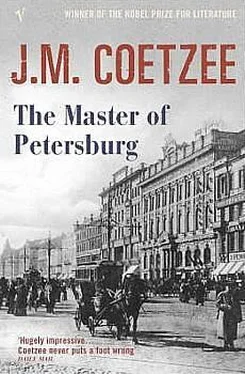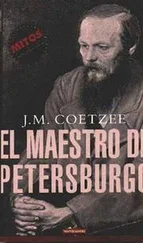'And what of Ivanov? Must reason tell me you are innocent of Ivanov's death too?'
'Who is Ivanov?'
'Ivanov was the name employed by the wretched man whose job it was to watch the building where I live. Where Pavel lived. Where your woman-friend called on me.'
'Ah, the police spy! The one you made friends with! What happened to him?'
'He was found dead yesterday.'
'So? We lose one, they lose one.'
'They lose one? Are you equating Pavel with Ivanov? Is that how your accounting works?'
Nechaev shakes his head. 'Don't bring in personalities, it just confuses the issue. Collaborators have many enemies. They are detested by the people. This Ivanov's death doesn't surprise me in the least.'
'I too was no friend of Ivanov's, nor do I like the work he did. But those are not grounds for murdering him! As for the people, what nonsense! The people did not do it. The people don't plot murders. Nor do they hide their tracks.'
'The people know who their enemies are, and the people don't waste tears when their enemies die!'
'Ivanov wasn't an enemy of the people, he was a man with no money in his pocket and a family to feed, like tens of thousands of others. If he wasn't one of the people, who are the people?'
'You know very well that his heart wasn't with the people. Calling him one of the people is just talk. The people are made up of peasants and workers. Ivanov had no ties with the people: he wasn't even recruited from them. He was an absolutely rootless person, and a drunkard too, easy prey, easily turned against the people. I'm surprised at you, a clever man, falling into a simple trap like that.'
'Clever or not, I don't accept such monstrous reasoning! Why have you brought me to this place? You said that you were going to give me proof that Pavel was murdered. Where is the proof? Being here is not proof.'
'Of course it is not proof. But this is the place where the murder happened, a murder that was in fact an execution, directed by the state. I have brought you here so that you can see for yourself. Now you have had your chance to see; if you still refuse to believe, then so much the worse for you.'
He grips the railing, stares down there into the plummeting darkness. Between here and there an eternity of time, so much time that it is impossible for the mind to grasp it. Between here and there Pavel was alive, more alive than ever before. We live most intensely while we are falling – a truth that wrings the heart!
'If you won't believe, you won't believe,' Nechaev repeats.
Believe: another word. What does it mean, to believe? I believe in the body on the pavement below. I believe in the blood and the bones. To gather up the broken body and embrace it: that is what it means to believe. To believe and to love – the same thing.
'I believe in the resurrection,' he says. The words come without premeditation. The crazy, ranting tone is gone from his voice. Speaking the words, hearing them, he feels a quick joy, not so much at the words themselves as at the way they have come, spoken out of him as if by another. Pavel! he thinks.
'What?' Nechaev leans closer.
'I believe in the resurrection of the body and in life eternal.'
'That isn't what I asked.' The wind gusts so strongly that the younger man has to shout. His cloak flaps about him; he grips tighter to steady himself.
'Nevertheless, that is what I say!'
Though it is past midnight when he gets home, Anna Sergeyevna has waited up. Surprised at her concern, grateful too, he tells her of the meeting on the quay, tells her of Nechaev's words on the tower. Then he asks her to repeat again the story of the night of Pavel's death. Is she quite sure, for instance, that Pavel died on the quay?
'That is what I was told,' she answers. 'What else was I to believe? Pavel went out in the evening without mentioning where he was going. The next morning there was a message: he had had an accident, I should come to the hospital.'
'But how did they know to inform you?'
'There were papers in his pockets.'
'And?'
'I went to the hospital and identified him. Then I let Mr Maykov know.'
'But what explanation did they give you?'
'They did not give me an explanation, I had to give them an explanation. I had to go to the police and answer questions: who he was, where his family lived, when I had last seen him, how long he had lived with us, who his friends were – on and on! All they would tell me was that he was already dead when he was found, and that it had happened on Stolyarny Quay. That was the message I sent Mr Maykov. I don't know what he then told you.'
'He used the word misadventure. No doubt he had spoken to the police. Misadventure is the word they use for suicide. It was a telegram, so he could not elaborate.'
'That is what I understood. I mean, that is what I understood had happened. I have never understood why he did it, if he did it. He gave us no warning. There was no hint that it was coming.'
'One last question. What was he was wearing that night? Was he wearing anything strange?'
'When he went out?'
'No, when you saw him… afterwards.'
'I don't know. I can't remember. There was a sheet. I don't want to talk about it. But he was quite peaceful. I want you to know that.'
He thanks her, from his heart. So the exchange ends. But in his own room he cannot sleep. He remembers Maykov's belated telegram (why had he taken so long?). Anya had been the one to open it; Anya it was who came to his study and pronounced the words that even tonight beat in his head like dull bells, each pealing with its full and final weight: 'Fedya, Pavel is dead!'
He had taken the telegram in his hands, read it himself, staring stupidly at the yellow sheet, trying to make the French say something other than what it said. Dead. Gone forever from a world of light into the prison of the past. With no return. And the funeral already taken care of. The account settled, the account with life. The book closed. Dead matter, as the printers say.
Mésaventure: Maykov's code-word. Suicide. And now Nechaev wants to tell him otherwise! His inclination, his wholehearted inclination, is to disbelieve Nechaev, to let the official story stand. But why? Because he detests Nechaev – his person, his doctrines? Because he wants to keep Pavel, even in retrospect, out of his clutches? Or is his motive shabbier: to dodge as long as possible the imperative that he seek justice for his son?
For he recognizes an inertia in himself of which Pavel's death is only the immediate cause. He is growing old, becoming day by day what he will at the last undoubtedly be: an old man in a corner with nothing to do but pick over the pages of his losses.
I am the one who died and was buried, he thinks, Pavel the one who lives and will always live. What I am struggling to do now is to understand what form this is in which I have returned from the grave.
He recalls a fellow-convict in Siberia, a tall, stooped, grey man who had violated his twelve-year-old daughter and then strangled her. He had been found after the event sitting by the side of a duckpond with the lifeless body in his arms. He had yielded without a struggle, insisting only on carrying the dead child home himself and laying her out on a table – doing all of this with, it was reported, the greatest tenderness. Shunned by the other prisoners, he spoke to no one. In the evenings he would sit on his bunk wearing a quiet smile, his lips moving as he read the Gospels to himself. In time one might have expected the ostracism to relax, his contrition to be accepted. But in fact he continued to be shunned, not so much for a crime committed twenty years ago as for that smile, in which there was something so sly and so mad that it chilled the blood. The same smile, they said one to another, as when he did the deed: nothing in his heart has changed.
Читать дальше












